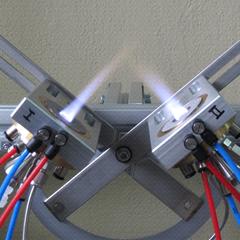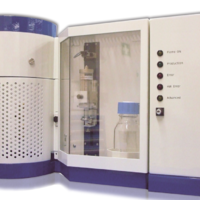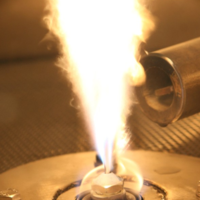Flame Spray synthesis: Oxide Nanomaterials, phosphates and metals
ParteQ offers Flame Spray Pyrolysis (FSP) Reactors for nanoparticle synthesis from turnkey lab-scale FSP systems to pilot-scale units with kg/h production rate. We also offer nanoparticle production and development services.
Flame Spray Pyrolysis (FSP) is a versatile and cost-efficient production process for nanoparticles. It relies on the combustion of liquid raw materials containing metal or transition metal compounds at temperatures up to 3000°C. Product nanoparticles are formed within milliseconds and collected as a dry powder on a filter.
The FSP process benefits from an extremely short process chain, enabling the production also of complex nanoparticles in a single step.
Product Nanopowders
FSP typically produces highly-crystalline oxide nanopowders but phosphates and pure metals have been synthesized as well.
This includes single- and multicomponent oxide nanoparticles as well as noble metal clusters on oxide supports. For some compositions, surface-coated or matrix-imbedded nanoparticles can be made. A typical particle size range is 10 to 50 nm depending on the process conditions.
Applications of FSP nanoparticles include:
- Catalysts
- Battery materials
- Ceramics
- Pigments
- Dental and biomedical materials
- Gas sensors
- Polymer nanocomposites
- Electroceramics
- …
Raw materials
The starting materials for FSP are low-cost metal compounds such as carboxylic acid salts, nitrates, or organometallics. These so-called “precursors” are mixed or dissolved in standard organic solvents (e.g. alcohols, aromatics) that provide the energy for the flame synthesis. Oxygen is required to enable complete combustion.




